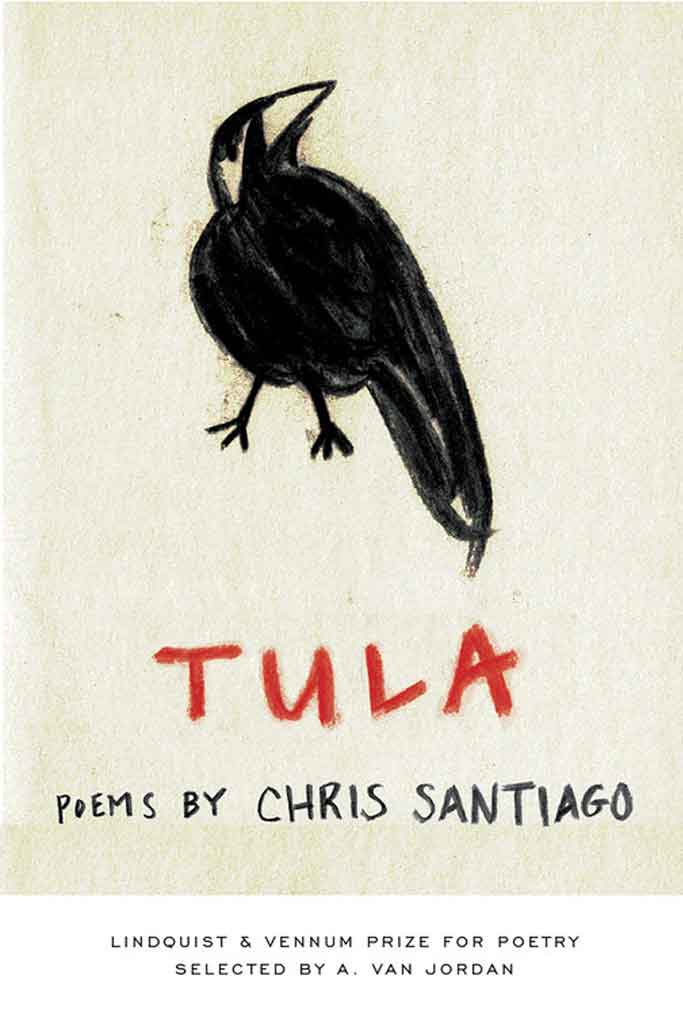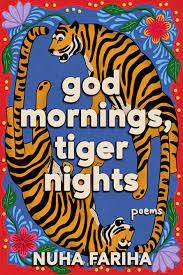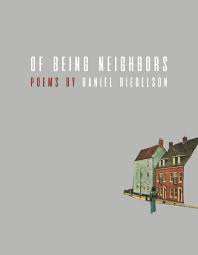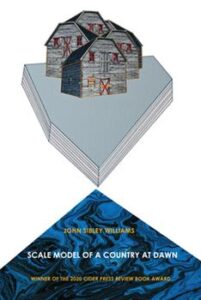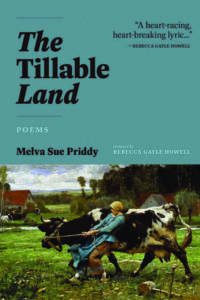Review by Tyler Burdwood // July 31, 2017
Milkweed Press, December 2016
Paperback, 100pp., $16
Chris Santiago’s first book of poetry, Tula from Milkweed Editions, opens with a definition. It turns out “tula,” referring not to four letters but two syllables, two sounds, exists as many words in many languages. Many poems in the book are titled only, “Tula,” and each time the words’ multiplicity of meanings render the title as withholding as “Untitled.” Tula can be “slang for cock in Chileno” or a pre-Aztec Mesoamerican city whose name translates to “near the cattails.” In Santiago’s unnamed “mother tongue,” Tula means simply “a poem.” This is likely a meaning of Santiago’s own making, as one poem addresses his childhood listening to his mother “[sing] a soothing song / in the language I never learned.” Not knowing the words’ definitions, he would make his own. Santiago’s interest in the overlap of sound and meaning, words’ transformations across cultures, permeates the collection.
Santiago’s fascination with a word’s meaning across languages and cultures is easy to trace. The son of Filipino immigrants, Santiago has taught English in Japan and Japanese in California. In “ultra / sound,” the word “kibo” gets the full “tula treatment,” a poem springing from its definitions in three languages.
Of course, one word in another language with another spelling, another alphabet, is not the same word at all. It’s a sound. Two recurring written characters separate the book into sections. I first took these to be the author’s stylized, sideways initials, but they turn out to be the pre-colonized Philippines’ phonetic spelling of “tula.” In “Transpacific” the word morphs into “Tulang: poem pluralized to strangeness. / Made nasal, ng a sound / that will never start its own word / not in this tongue.” The book has no shortage of fresh imagery and storytelling around music and sound. The inner ear is described as a fetus. One poem ends with a family listening repeatedly to the last remaining LP, one none of them enjoys, “after the world has ended.” Santiago’s poems venture in and out of surrealism with ease, always more riddle than psychedelia.
Lullabies (or hele), definitions, islands, and waves reoccur throughout the book. One poem, like many others titled “Tula,” opens with the warning “I live mostly in dreams.” Its speaker shifts from an inmate to a bird lost flying over open waters, hinging on the word of an uncle who “speaks / the language of the dead.” The poem tempts strict interpretation, just as dreams do, but has just enough of the shimmering undefined. But elsewhere a dead and imprisoned uncle refers to Fluellen Ortiga’s imprisonment in solitary confinement and his killing by the Marcos Administration’s secret police. Shadows of political violence are addressed throughout the book with a straight-faced frankness. Solitary confinement is described as “learning how not to drown in time.”
Santiago never resists looking closer, diving deeper. What reads as ars poetica, “Island En Passant” describes building a piano of found materials on an island. There is a meditation on cultural exchange there, but the magic comes from the description of living things taking over the piano, “afraid of their own infinitesimal steps: / music the stars would make if they // were as small as they looked.” The mystery latent in tiny ecosystems reappears as a reference to Malasia’s Taman Negara national park, a 130 million year old rainforest which never experienced an ice age and thus has incredibly rich biodiversity. The poem is called “Photograph: Loggers at Kuala Than,” which chronicles the poet’s drinking with the laborers in process of the natural wonder’s deforestation. The poem doesn’t dwell explicitly on his forest, and instead follows the speaker’s efforts to develop the photo, his broken promise to send them a copy. Something of the resonances with a picture stealing a soul, the poem stealing their biography, the loggers transforming the woods all push and pull together.
Santiago’s poems feed thought. The ideas are big, the details tiny and inventive. He’s a musician’s poet, a linguist’s poet, a poet’s poet. Tula is a good read for anyone.
ABOUT THE REVIEWER
Tyler Burdwood plays, writes poetry, and sings in the power pop band, Bellwire. He manages the blog and record label, Spark & Fizz.


